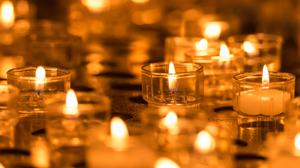Solemnity of All Saints
Scripture:
Revelation 7:2-4, 9-14
1 John 3:1-3
Matthew 5:1-12a
Reflection:
In the Church’s liturgical calendar, each November begins with the great feast of “All Saints” and then turns to “All Souls.” The exuberant Scripture readings include the gospel selection from the beatitudes, the beginning of Jesus’ Sermon on the Mount found in Matthew’s Gospel, one of the New Testament’s most well-known passages. Jesus blesses those who are poor and downtrodden and lifts up those who exemplify the very values and commitments that mark his own ministry: the peacemakers, the merciful, the clean of heart, those who hunger and thirst for justice. The first reading today is a portion from the Book of Revelation where the author, John, is treated to a vision of a “great multitude” from “every nation, race, people and tongue”—a vast procession of those who worship God and have followed Jesus, the Lamb of God. Wedged between these readings is a beautiful selection from the First Letter of John, reminding his “beloved” Christians that God’s love for them is so intense that may be called “children of God.”
Who are the people addressed in these biblical readings? Who is included in this feast’s “all Saints”? Surely, as the reading from the Book of Revelation illustrates, it includes the saints from all ages past—from Augustine, the great theologian to Theresa, the Little Flower, from Agnes the early Roman martyr, to the Medieval mystic Hildegaarde of Bingen, from St. Monica, the mother of Augustine to Mother Theresa, the mother of the poor. Not all the saints are formally declared such—in his address to the U.S. Congress, Pope Francis cited two such “unofficial” saints such as Dorothy Day and Thomas Merton. And there are all the other “saints” in that great procession of the followers of the Lamb—family members and friends we have known and whose memory still inspires us.
But this feast of “All Saints” honors more than our beloved dead. We the living should also be listed among the “saints.” In his letters to his communities, Paul the Apostle repeatedly called his fellow Christians the “saints” or the “holy ones.” For Paul every baptized Christian was imbued with God’s grace and therefore was “holy.” In Paul’s view it was not a matter of a follower of Jesus having to try to “become holy”—a Christian was already graced by God, already a “temple of the Holy Spirit,” even now, a member of the “Body of Christ.” That is the same view expressed in John’s letter: “Beloved, we are God’s children now.” The challenge is to “be ourselves”—that is to live a life expressive of who we truly are. “Become what you are” is one way of thinking about what we seek to do in living a life in accord with the gospel.
This great feast—and the feast of All Souls that will follow—views the church as one innumerable assembly of people united and graced by God’s love. A people that includes those of us who live now in this world, who, in the words of today’s responsorial psalm, “long to see God’s face,” and those who have gone before us and now see the ultimate source of all life and all joy “face to face.”
Fr. Donald Senior, C.P. is President Emeritus and Professor of New Testament at Catholic Theological Union. He lives at the Passionist residence in the Hyde Park neighborhood of Chicago.
